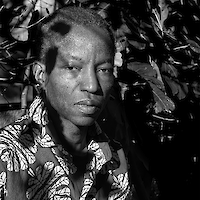Can one write the self? I don’t mean writing about the self, but rather (actually) writing it, inside out, at the margins, in the space between, in the mean time, and beyond. Isn’t such an attempt bound to fail anyway? Even then, so what? Doesn’t this inevitable failure itself constitute the raison d’être of the doomed undertaking in the first place?
Still, pecking at the edges of lean possibilities, refusing defeat before giving it even a hesitant fight, going in a roundabout way, let’s give a shot at: 1) the inevitability of neurotic self-duplication, the fodder for trivial self-involvement and propagation, 2) the parallel construction and negation of the self, the other, and the almost the same, or 3) even the ability to telescope and tie up contrary timelines, the uncanny practice of predicting the past.
In all this, writing the self, at least attempting or pretending to, involves a measure of fictionalizing it. This may be old news indeed, the fact that not being able to see one’s own face, one is resigned to lifting a mirror to it. As rumor has it, that ancestor who turned a stream into his mirror ended up drowning in it – in both the stretch of water and the splash of light.
Mohomodou Houssouba (*1965) is a writer and linguist. Coming from a background in African American and Diaspora Studies, he studies the construction of identities and the articulation of identity politics in this literary field.
He lives and works in Basel, Switzerland. His work on the Songhay language is accessible at www.songhay.org.
Authors website:
keywords:
#selfportrait, #selfduplication, #selfinvolvement, #predictingthepast, #mirror
The selfless selfie
I found out I had lived, before I was born,
in hard, sturdy, independent men, their own masters.
None of them knew what to say, so they just kept quiet…
When I found my friends, I found my real home –
land so worthless a man’s got a perfect right
to do absolutely nothing, just dream about the future.
– Cesare Pavese, "Ancestors" ("Antenati", Lavorare stanca)
I have fed out of the drum
I have drunk out of the cymbal,
I have entered your bridal
chamber; and lo,
I am the sole witness to my homecoming.
– Christopher Okigbo, "Distances", Labyrinths
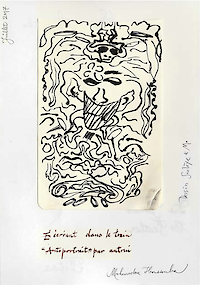
I was about 20 years old when I first read Au Congo jusqu’au cou. It was a common story of an unknown book lying on the shelf of a one-room library, the erstwhile Libyan Cultural Center in Bamako, Mali. Maybe the lavish green landscape on the cover page struck me as particularly exuberant, if not extravagant, grabbed my attention at once, and ordered me to retrieve that object from the lot and sit down to visit it, page by page, day after day. I quickly delved into the adventure of the author’s group of Frenchmen, apparently very young, traveling along the overgrown trail of the impenetrable rainforest in Congo. During the mission, every step seems to engage a struggle, not just with an uninviting natural world, with its countless mysteries and dangers, but with oneself, as individual and group. Actually, the collective dimension unfolds and evolves as the mission inches deeper into the forest, as if closing a "gate of no return", with hardly any peripheral vision, the French team guided by porters from the local communities of the equatorial forest, randomly called "Pygmies". The companions of the trekkers (Bambenga, Bambuti, Bawta) soon became full characters in the course of the narrative, the details of which no longer stick in my memory so many years after. Still I distinctly remember the episode in which the French were surprised to realize that the porters did not recognize themselves when shown their own pictures.
Now, I am struck by the impression their bemusement made on me though I grew up in a village in the Sahel and would not leave my native country until two years after reading the book. I wonder about the implications of this failure to recognize one’s own face in a photo. Is it because the forest men were unable or unwilling to? What does it mean if one is not preoccupied, that is, obsessed by the face-image reflected back by the lens of a camera, collected and printed on paper to be shown and shared? We were in 1985, when showing a snapshot almost instantaneously on a screen was not a common practice. To be sure, the technology of the instant camera was already developed in 1933 and became commercialized in 1947, and is surviving digital photography, even as its emblematic companies went out of business: Kodak in 1985 and Polaroid in 2008. To date, the Impossible Project has actually succeeded in resurrecting a defunct industry and making instant analog photography an option, at least for its enthusiasts, old and young.
Back to the forest trail across the Congo, I can imagine that these men were not particularly preoccupied by their own faces; let’s say by the scars and wounds which, elsewhere, men and women spend a fortune to repair or remove. Not to be facetious about the way the traces of life’s battles and bruises seem to breed such deep inner brooding, resentment and at times obsessive reparatory measures, corporeal and mental reform. Yes, there is a habit, if not a culture, of aggressive counterattack against physical and esthetic setbacks. No, this is not to say that the physical mending of living human bodies is all frivolity, just another way affluent people extend their sphere of excess spending. Indeed there are situations in which cosmetic surgery enables poor children and adults to be reintegrated into social life and given a second chance at making a worthy livelihood.
Taking, in passing, the myth of Narcissus, I can’t help pondering whether and how it could manifest itself among those forest dwellers, who, though they might spot daily their own facial reflections in the streams from which they drink or fetch water, do not seem to dwell on self-image. This passing remark is not a categorical statement meant to fix a dubious essence of the gaze, namely of self-regard. I am rather hinting that even if admiring one’s reflection over the surface of water were a universal practice, this would not change the specificity of the contemporary economy of self-image as it has proliferated in textual and audiovisual production. Its obvious manifestation can be caricatured in the global explosion of self-staging and self-promotion. Still, as in the case of cosmetic surgery, it will be hazardous to stop at this dismissive description of a rather complex practice, involving an imbrication of needs, urges and desires that range from the personal way individuals of all walks of life have found in social media a means of affirming their ordinary, even anonymous existence to the skillful self-promotion of a savvy "influencer" or entrepreneur of the self, who, in a social reality setting or through a streaming canal, manages to build a fortune, an empire, under the gaze of the world of followers, an exquisite self-constituted clan of strangers as unsuspecting generous givers. Thus, all things considered, we can envision the possibility of selfless self-representation, in writing, sound or image. I don’t pretend to have any evidence to bring forth in this regard, yet I don’t have any reason to think that the person who scribbles in his or her notebook private or general thoughts and feelings engages in self-promotion. I am aware of the delicate border to tread here, but the great majority of writing on popular social media seems to translate a rather basic need to relate – to the next of kin, the acquaintance, or any potentially interested human being out there, somewhere. (I am avoiding the term "friend" on purpose here.) To be sure, there is an implicit quest for a public, an audience, a readership, however big or small, tangible or diffuse. It is equally true that the congregation of even disparate posts on different social media ends up creating a market, the commercial value of which, measured in several billions of dollars as well as the expanding list of youngish billionaires behind the platforms, represents the fastest-growing component of global economy. Even on the political level, the same process of data aggregation is making targeted political marketing the key driver in elections; that is, of victory and defeat, of conquest and loss of power, of the redistribution of the cards of might, and that in both democratic and autocratic systems. Increasingly, the "last man standing" seems to be the man or woman who has convinced the majority to construct (for him or her) an image of the one, the only one, who is suitable to hold and steer the rudder.
Again, this may sound like restricting material or political influencing to so-called democratic systems. Indeed, the outrage over outside interference with recent elections in the USA and other Western countries crystallizes the sense of loss in the meaning of the "one person one vote" premise of the ballot as royal way to ensure the orderly redistribution of cards, especially of regular change in political leadership. Nonetheless, it is worth noting that even the external suspects of electoral manipulation, considered non-democratic or outright authoritarian regimes, rely on the same data-driven machinery to chisel and enhance self-image through the gaze of the others, when as large a chunk of the ordinary population as possible adheres to it. The result may be subtler than the direct, at times bloody, change at the head of the politburo. It is, for example, even more striking when a poll run in all apparent transparency yields a plebiscite for the very act of not having free press and media, open elections, and critical art and literature. Or, conversely, the fact that the prescription for the press and media, art and literature, and even daily self-expression to be exclusively "correct", patriotic, and affirmative of the official discourse on past and present seems accepted by the majority of the people polled, tells us that, in the end, the non-democratic systems equally rely on what Chomsky called "manufacturing content". Increasingly, the most sophisticated tools of massive digital data and artificial intelligence are used to bring the majority to take the given system as the natural order of things.
At the same time, the fact is that outside influencers could change the course of a presidential election in a superpower that considers itself immune to such prevarication, on account of, not just its time-tested electoral process, but more, a sophisticated political education, which trains every voter to jealously defend independent and critical thinking above all. The ease with which, not just the well-oiled electoral machinery mainly driven by expensive negative advertising, but especially foreign online tacticians could "divert the course of the river," so to speak, illustrates the structural fragility of the liberal democratic system. It becomes clear that the worm has been in the fruit for quite a while. Actually, for example, the US electoral system, with age-old strategies of willful disenfranchisement through "grand-father clause", gerrymandering and hyper-inflated campaign costs has hardly ever been true to its promise. Maybe the most effective aspect of manufactured consent has actually been the ability to make folks accept the result of an eternally flawed system suffused with a powerful imagery of exceptionality. To be sure, America’s manifest destiny is not the only of its kind on the face of the earth. The up-and-coming powers will not miss the moment of collective bedazzlement. Only that now, as far as the USA is concerned, even that precarious dam or wall seems to cave in in the quicksand, in a dystopian quagmire. In the end, 2020 is indeed a memorable year, for the Coronavirus pandemic for sure, and not less for the much anticipated but still bemusing US-American post-election crisis.
Let me backtrack to my encounter with the story of the forest people not recognizing their own photos. Four years later, in 1989, I would get a totally different story from hearsay, this time in Niamey, Niger. Accordingly, there was an old man who used to travel without ever carrying an identification document. All he kept in his wallet was a black-and-white ID photo. He used to travel this way across borders in West Africa, from his native Mali to neighboring Niger, on to Ghana or Nigeria. Since it was already a common practice to present a photo ID at control posts, he would always engage in longwinded arguments with security agents who insisted on seeing an identity card. He would argue, his small photo in hand, that anyone who really wanted to know his identity only had to look at his face and match it with the picture. The rest was irrelevant, if not absolute, irreverent nonsense. Then he would delve into the past: how, as a young man, he was forcibly drafted into the colonial French army to fight the Germans on European soil, returned after years spent on those remote killing fields, retired, enrolled again as soldier in the Malian army, served until he retired… for good. And after all this, young men who had never fired a gun in their lives should dare demand an ID from him. Often, to the annoyance of the less amused fellow travelers, he would tell his name and wag his small photo in the face of the guards until they let him go. This Sahelian veteran of the colonial and post-independence armies seemed to have another sense of self-regard, clearly inscribed in the picture and name that built his self as rank and file warrior of two eras. These were sufficient proof of otherwise unreadable evidence: the missing travel document.
To be sure, the Pygmy porters of Patrice Franceschi’s team didn’t seem to have been burdened by either identification photography or travel documentation in 1975. The French author was 20 years old when he took part in the mission across the forest with three other countrymen his age. In 1985, I was reading the book that had come out three years earlier. As they had been nearly my age during the trip ten years before, I now know why I could identify so closely with them and went away with such a powerful mental imagery. Thirty-five years later, I could get some additional details by searching on the internet. He is 66 years old now, still younger than I anticipated.
I would be only slightly above his age (in the story) when I left Mali for the first time, flying to the USA for a seven-week creative writing summer school. That was in 1987. I had never made the connection between his trek through the green world of the Pygmies who did not “see” themselves in photos and the over-exposed nightline of American cities: Washington, DC, but especially New York City. But now I daresay I probably make too many connections with an episode, which I may even totally misconstrue here, as I rely on the faint memory from my first reading. But it came to me as I took anew The Source of Self-Regard off the shelf. Toni Morrison’s reflections on the history of crafting racial and religious identities and patrolling the strict borders erected around them could be well complemented by Achille Mbembe’s Politics of Enmity, like two dark beams to help us enlighten the entanglements of identity politics, internal conflict and geopolitical strife. Between indifference and heightened self-righteousness, the politics of the self confronts us with an inextricable dilemma, as even the most benevolent initiatives seem polluted at the inception, compromised, or at least predictably fragile in their putative outcomes. This is not to dismiss action or struggle, but to call for a relentless awakening to the dangers lurking in the dark; let’s say, behind the best of intentions.
I have started with an image about the lack of image, or what some might call the absence of a culture of the image on the one hand, and a glut of imagery on the other. To be sure, image is not equal to picture, and picture does not equate self. But, it seems that, well, the self hinges on an image or images one makes (out) of it. Thus, I cannot conceive of a person who doesn’t have an image of self. This is what makes writing possible in the absence of a picture. In other words, it may well be that writing the self is at its best when it happens in the absence of a picture of the individual or collectivity, when it ventures way out of the familiar lane, when it rather helps defamiliarize and alienate the self. A self-portrait is an impossible undertaking in the first place, and in its improbable realization, veers to self-fictionalization. With regard to the outcome, it is most unhelpful to anticipate any success, rather a plausible result, which straddles the borders of the familiar and the outlandish.
I say this in particular thinking of the first generation of African writers who, learned to write in Arabic and European languages that were absent from their daily lives. Writing from inside out, without a prior written “language” is to me the equivalent of rubbing one’s image of self with the printed picture of one’s face that has never been seen before. The exercise involves fetching one’s inner image from the inner eye of the other. This is perhaps the reason why, as I recall, the exercise of the Swiss (women’s) art collective Pol 5 in San Miguel de Allende (Mexico 2003) titled “Lend me your eyes” (“Leih mir deine Augen”) spoke to me profoundly. The visiting artists had asked the local artists to look at objects and places in their area and (re)create those sights for them. Regardless of the result, the underlying principle stands in stark contrast to the “colonial” habit of the visitors' forcing the native to learn actively to see the world through their eyes. Learning a foreign idiom under duress, speaking and writing it, using it to talk back, in a position of submission, but also of potential dissent and revolt. Thus, writing the self from a colonial or post-colonial standpoint can be fraught with mind-boggling contradictions. It is not this or that; it is this and that and especially more: the blurred image of self, the emphatic pose with the picture of self as self-evidence, full biography and even administrative or legal identity, the self-conscious regard forged in light of the prevailing economy of the image, as ultimate material and political good.
Itchings and Scratchings
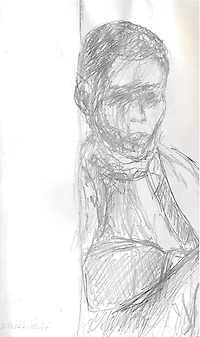
Itineraries
The trip begins in a landlocked country with a navy and old sea captains,
geologists and dark men who speak quick Arabic.
Where is she? On a slow boat to China with her braids floating
on saltwater. The country used to have a port before secession.
Next to her a man who either carries all his money in a leather pouch
or keeps it buried at home.
The import/export industry is booming, maritime is a beautiful word
when the Indian Ocean is all you have between you
and a promised land.
– Clifton Gachagua, "A Slow Boat to China", Madman at Kilifi
For twenty years he knocked around the world.
I was still a baby, not yet walking, when he left.
They spoke of him as dead. Later, I heard the women
talking of him as if he were a character in a story.
The men, more matter-of-fact, just forgot him.
Then, one winter, a postcard came addressed to my father
(he had been dead by then), with a great big greenish stamp
showing ships in a harbor, and a message wishing us
a good harvest. Nobody knew what to make of it,
but the boy, much bigger now, breathlessly explained
that the card came from an island called Tasmania,
with blue water all around it, seething with sharks,
in the Pacific Ocean, south of Australia. His cousin,
he added, must be a pearl-fisherman. And tore off the stamp.
– Cesare Pavese, "South Seas", ("I mari del Sud", Lavorare stanca)
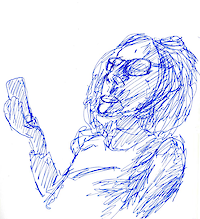
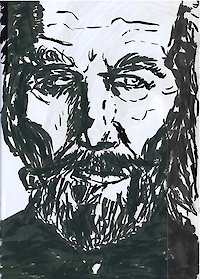
"If you forget everything else that has been said, I would suggest that you remember this for the future: From now on, everybody stands on his own feet".
– Thomas Merton, The Asian Journal of T. Merton

Precarious hideouts
The mouse is seemingly wary of leaving the hole, despite the promise of joyful togetherness. Can I really come out now? Are the others still there? Will it be safe for us all out together?
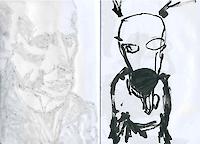
After two unpredictable spells
of influenza that winter
I was taking no chances
(not even to put the rubbish outside)
pulling on my old black jacket
resolutely winding
a scarf round and round my neck
winter rituals I had grown to
accept
with all the courage of an unemerged
butterfly
I unbolted the door and stepped outside
only to have that daffodil baby
kick me in the eye
– Grace Nichols, "Spring", The Fat Black Woman’s Poems
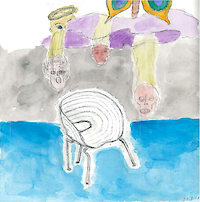
A foreseeable reunion
What a nightmare, waking up screaming in the middle of the night. All these people surrounding you, smiling and laughing in your face! Face to face… But this too will pass. The garden chairs on the porch, the grill man grinning in his attire, oozing with self-confidence, soon the delicious smoke curling across the dividing wall to greet the neighbor who continues to be fenced in; one can say by then, out of habit – a second nature. Not you, who have just lifted high the sparkling glass toward the trail of smoke rising above the trees.
Talking to elves and selves
Indeed, if it is only about a wall, then, most likely, it is a lot, if not all, about the wall.

Before I built a wall I'd ask to know
What I was walling in or walling out,
And to whom I was like to give offense.
Something there is that doesn't love a wall,
That wants it down. I could say "Elves" to him,
But it's not elves exactly, and I'd rather
He said it for himself. I see him there
Bringing a stone grasped firmly by the top
In each hand, like an old-stone savage armed.
He moves in darkness as it seems to me,
Not of woods only and the shade of trees.
He will not go behind his father's saying,
And he likes having thought of it so well
He says again, "Good fences make good neighbors".
– Robert Frost, "Mending Wall"
Cerca de grandes muros quem te sonhas.
Depois, onde é visível o jardim
Através do portão de grade dada,
Põe quantas flores são as mais risonhas,
Para que te conheçam só assim.
Onde ninguém o vir não ponhas nada.
– Fernando Pessoa, "Conselho", Cancioneiro
Put high walls around the part of you that dreams yourself.
Place as many cheerful flowers as you can
There where the gardens may be seen
Behind the gate, between the bars,
So they may recognize you this way only.
Where no one sees it, put nothing.
– Fernando Pessoa, "Advice"
A last, almost desperate attempt at leavetaking
Some are gone despite the steady feed of fresh air and the soft tired gaze of the kind healers, many have returned from the house of the ill, some are still waiting for their turn to catch a scarce bed. Some came back after bidding farewell, others departed after saying so long.
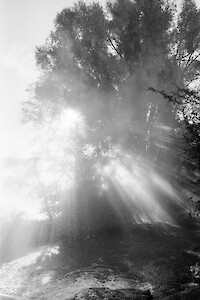
Go and tell them that I crossed the river
While the canoes were still empty
And the boatman had gone away.
My god of all songs was ill
And I was taking him to be cured.
When I went the fetish priest was away
So I waited outside the hut
My god of songs was groaning
Crying.
– Kofi Awoonor, "My God of Songs Was Ill", Rediscovery and Other Poems
Si è fatto tardi, cari;
Così non accetterò da voi pane né vino
Ma soltanto qualche ora di silenzio…
– Primo Levi, "Congedo", Ad ora incerta
It has grown late, my friends.
So I won’t accept bread or wine from you,
Only some hours of silence…
– Primo Levi, "Leavetaking", Collected Poems
Sketches and drawings
Soulèye Gisler
Essay and marginal notes
Mohomodou Houssouba
Original works
– Kofi Awoonor, The Promise of Hope: New and Selected Poems, 1964-2013. Dakar: Amalion, 2014.
– Edward S. Herman and Noam Chomsky, Manufacturing Content: The Political Economy of the Mass Media. London: Random House, 1995.
– Patrice Franceschi, Au Congo jusqu’au cou. Chez les Pygmées de la forêt équatoriale. Paris: Fernand Nathan, 1982.
– Robert Frost, North of Boston. London: David Nutt, 1914.
– Clifton Gachagua, Madman at Kilifi. Dakar: Amalion, 2014.
– Achille Mbembe, Politiques de l’inimitié. Paris: La Découverte, 2016.
– Pol 5. DRIFT, 2014. www.pol5.com
– Primo Levi, Ad ora incerta. Milano: Garzanti, 1984. (Collected Poems. London: Faber & Faber, 1988; À une heure incertaine. Paris: Gallimard, 1997).
– Thomas Merton, The Asian Journal of Thomas Merton. New York: New Directions Publishing Corporation, 1975.
– Toni Morrison, The Power of Self-Regard: Selected Essays, Speeches, and Meditations. New York: Knopf, 2019.
– Grace Nichols, I Is a Long-memoried Woman. London: Karnak House, 1983-1984.
– Grace Nichols, The Fat Black Woman’s Poems. London: Virago, 1984.
– Christopher Okigbo, Distances / Paths of Thunder. New York: Africana Publishing Corporation, 1971.
– Cesare Pavese, Lavorare stanca 1936 (Hard Labor. New York: Ecco, 1986).
– Fernando Pessoa, Cancioneiro 1930 (Poems of Fernando Pessoa. San Francisco: City Lights, 1986.)
